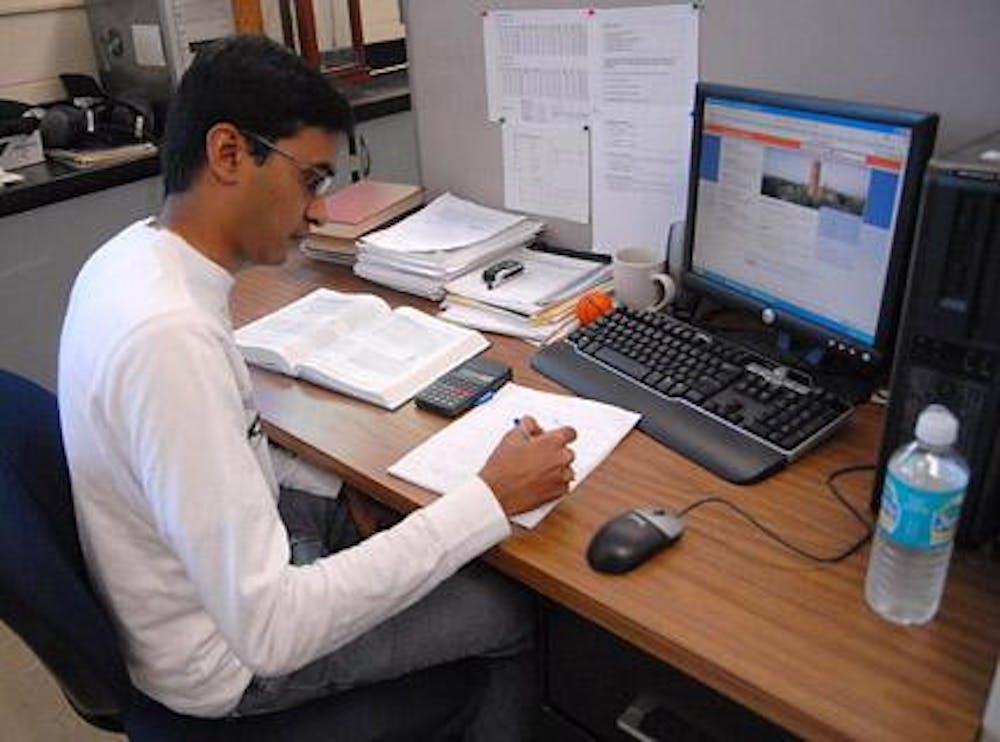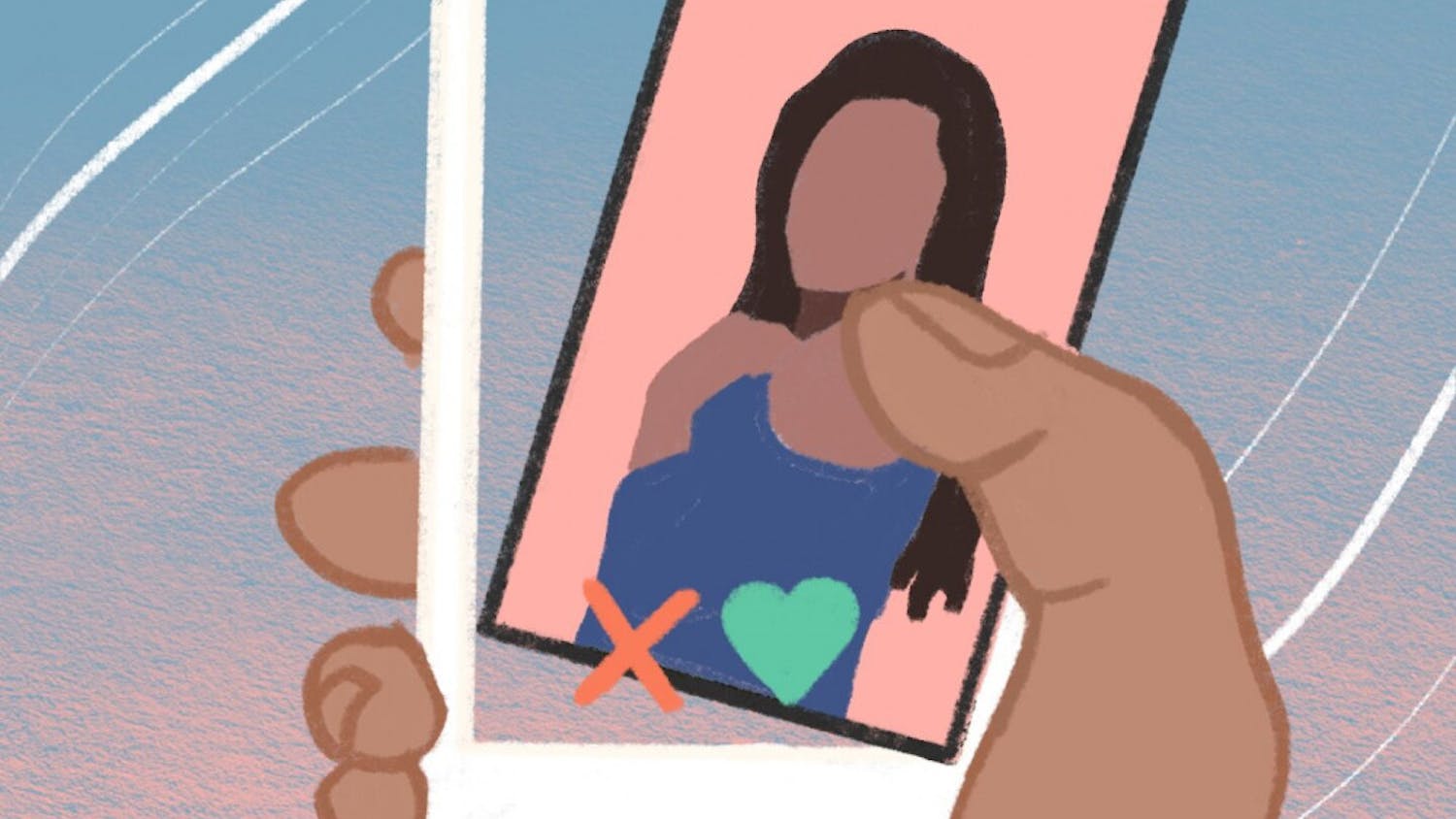Alma Othman arrived at the Gainesville Regional Airport after several connecting flights. To her, Gainesville was an unknown city in an unknown country. And she had no place to live.
All she knew was that the next day, she would have a seat reserved for her at UF. That's all that mattered.
For most students who come to study at UF, moving involves packing a few bags and driving a couple of hours. For international students the trip involves moving to a new country and adapting to a new culture.
About 3,500 current students made this trip, according to a fall 2007 International Center report. The majority arrived from India, China, South Korea, Taiwan and Turkey.
Their experiences are marked by change, struggle and opportunity that have influenced who they are and who they will become.
Making the Move
Othman, a Palestinian doctoral student in design, construction and planning, had little time to prepare her trip to America.
She recalls the frustration of not knowing where she would live when she arrived in Gainesville.
Othman had about four days to find living accommodations on her own, since the International Center does not assist students with housing.
This is a stressful process for many of them because everything is new and unknown.
"Unfortunately, we don't have the funding to facilitate students with housing," said Debra Anderson, coordinator for International Student Services at UF.
However, Anderson said some student groups help new students settle in.
Members of the Indian Student Association lent a hand to Shalabh Maroo, a master's mechanical engineering student from India. They helped him find an apartment and introduced him to new friends.
He moved into Park 16th Townhouse Apartments because other Indian students recommended the Southwest 16th Avenue area since it's close to campus, has a supermarket nearby and an Indian grocery store, Maroo said.
To help these students adjust to their new surroundings, UF's Graduate School has partnered with UF's Counseling Center to offer workshops to teach them about bureaucracy and culture in the United States, Anderson explained.
For example, Othman said she felt overwhelmed by the numerous rules and laws and how everything is overly organized - more than necessary - she thought.
"I am still learning how to deal with these complex rules," Othman admitted.
For example, Othman wasn't aware she had to fill out several financial aid and scholarship forms. She said it would be helpful if new students received more advice.
Anderson said she understands that many students feel inundated by the paperwork, but it's important that they learn and follow the process needed to get services.
Educational Challenges
For international students, studying at UF involves adjusting to a new academic environment.
The major fields of study for international students are engineering, and liberal arts and sciences, according to the report.
Konstantinos Ninios, a third-year physics graduate student from Greece, described his professors as understanding and accessible. Ninios said professors understand that international students might have a disadvantage when it comes to understanding the language.
For example, Ninios said some of his professors in the physics department who have several international students in the class speak slower in lecture or allow students to use a dictionary during an exam.
For Ryo Sakurai, an ecology graduate student, the educational environment at UF is more interactive than in Japan because professors and students work together, he said.
"In Japan, lectures are one-sided," Sakurai said. "Students remain quiet and don't raise their hands to make comments."
However, Maroo, from India, said the curriculum for students in his home country is more demanding.
"The curriculum in India is much tougher than it is here, but the technology here is more advanced," Maroo said.
Financial Woes
Tuition costs are the highest for out-of-state and international students.
While in-state graduate students pay $311.60 per credit, graduate international students pay about three times more at $941.79 per credit, based on 12 credits per semester. They are also required to purchase health and accident insurance at about $1,130 per year, according to the UF Office of Admission's Web site.
In the international program, 2,962 graduate students are currently enrolled compated to only 421 undergraduate students, according to the report. The significant gap between undergraduate and graduate students is because undergraduate students are not eligible to receive financial aid, Anderson explained.
Othman, the doctoral student from Palestine, funds her studies with a UF assistantship and a scholarship from the United States Agency for International Development, which supports students from developing countries. The two are enough to pay for her classes and live comfortably in a one-bedroom studio.
However, with tuition and living expenses in Florida rising, the scholarship program is not increasing its aid to match these rising costs, Othman said. This is a growing concern for her, since she has four years left to finish her doctoral degree.
In some UF colleges, international graduate students get a tuition waiver if they work for the department, usually as research assistants.
For example, Ninios works 10 to 12 hours a day as a research assistant in the physics department, and the job covers his tuition costs.
Social Adaptation
Some international students had never heard of the roommate concept before they arrived at UF, so for some it was an added worry when moving in.
In August 2007, Sakurai arrived in the U.S. when he swapped Tokyo for Gainesville. The 23-year-old's biggest concern was sharing an apartment in University Commons Condos with three strangers.
He was paired with two Italians and an Argentinian as roommates. To Sakurai's surprise, his new roommates' only request was for him to be himself. Sakurai said the experience has been better than he expected because he is learning about other cultures and experiencing a lifestyle different from his own.
Shortly after arriving, Sakurai experienced his first house party. Everyone who came in was welcomed with a hug and a double kiss on the cheek, even men to men, he said. It was an awkward moment, the kind where people hope their utter shock is not revealed through their expression, he said.
"In Japan, women and men never kiss in public," he said. But a few parties later, Sakurai was greeting his new friends Italian-style.
The college nightlife of Americans is also different from other countries. For Greek student Ninios, 25, going dancing for the first time in Gainesville was a memorable experience.
"The way people dance here is very strange," he said. "I tried to imitate them, but I didn't do so well," he confessed.
Ninios said the nightlife in Greece is very different. Greeks, he said, enjoy themselves more. In Patras, located about 130 miles west of Athens, all cafes and bars have sidewalk seating, so locals interact in the streets and no cars are allowed to pass through, Ninios said.
For Joey I. Orajay, a doctoral student from the Philippines, culture shock wasn't a concern when coming to the U.S.
Orajay had already completed his master's degree in Belgium, where Europeans had exposed him to plenty of craziness.
He said his passage through UF has been more of a personal journey. In the Philippines, Orajay was raised with the notion that his circle of trust included only his family and church members. He said being distanced from his loved ones has given him the chance to build strong relationships in his circle with people who are different from him.
"I am a much better person now than when I left my country," he said.
The 31-year-old has not gone back home since he arrived in Gainesville almost four years ago. He said it's expensive to travel during peak seasons, which are the times he gets off from school.
Orajay would rather spend his time getting to know the American continent. So far, he has been a tourist in New York City, Los Angeles, Las Vegas and Colorado.
"I've taken the opportunity to explore the U.S. because I don't know if I'll come back," Orajay said.
Looking Ahead
Many international students return home after completing their degrees, while others extend their student visas to continue studying or find a job in the states.
Upon earning his master's degree, Sakurai hopes a work visa will keep him in the country for a few years.
Then he will apply at the University of Montana's doctoral program to embark on his lifetime goal - studying wolves.
When Orajay finishes his doctoral degree in nematology this May, he plans to return to the Philippines. His purpose for coming to UF was to learn skills he could share with students at the University of the Philippines Diliman.
The university's only nematology professor recently retired and the university eagerly awaits Orajay's return to help rebuild their nematology program.
"I want to create an interest and enthusiasm among my students for a field that is underappreciated in the Philippines," he said.
But he will never forget his days as a college student in America.
"Meeting people from other countries, seeing a wide range of behaviors and being exposed to new ideas, opinions have really broadened my horizons," Orajay said. "I feel everywhere I go I can be fine and easily adapt to people because of my experience here."






